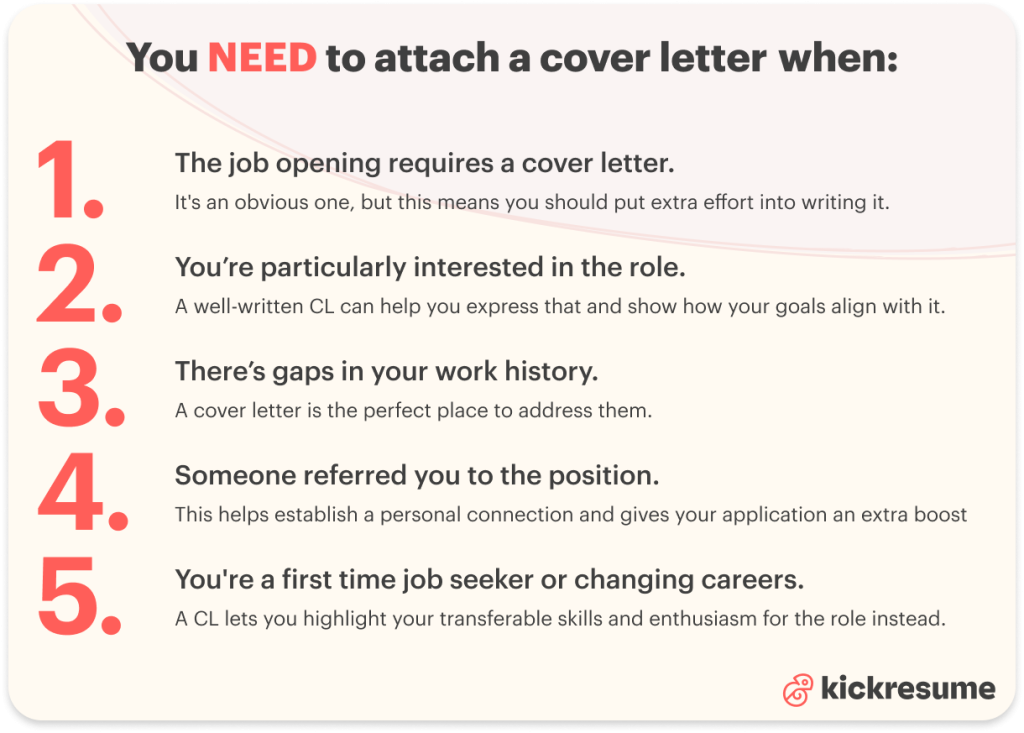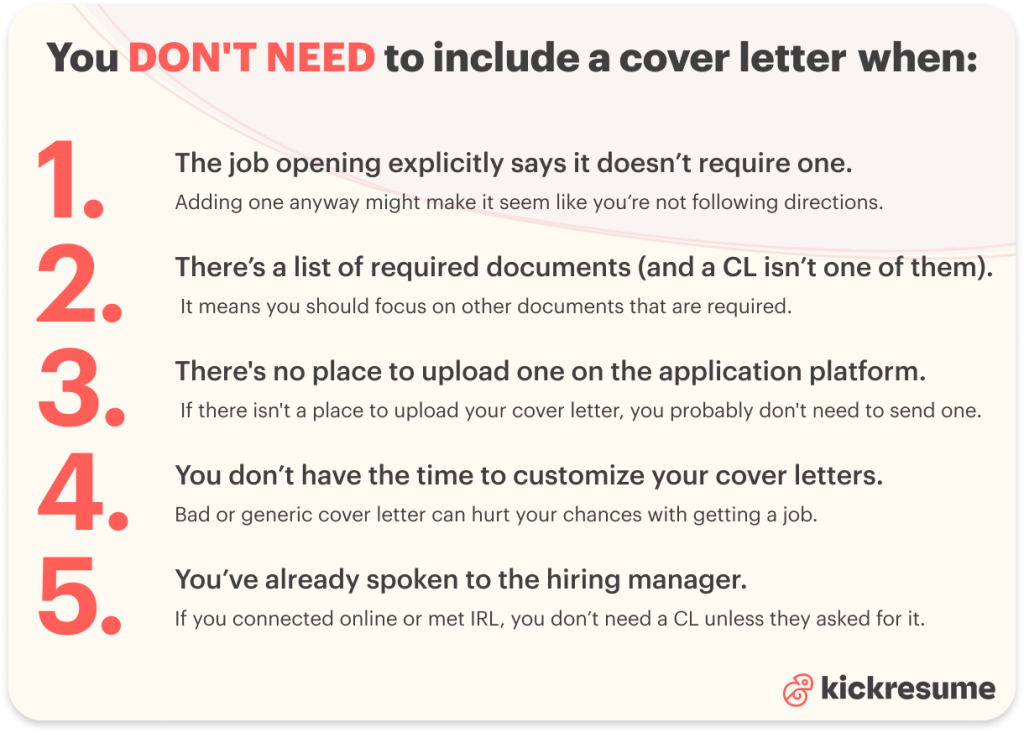You're in the middle of job searching, swamped with updating your resume, and filling out all those applications. Then, you think to yourself, 'Is a cover letter really necessary?'
We all know resumes are the MVPs (Most Valuable Papers) of job applications.
But what about cover letters?
On the one hand, they can seem like a relic from the past.
On the other hand, some people are very vocal about submitting one for every single job.
Truth is–it's neither.
This article will help you figure out when a cover letter is, in fact, absolutely necessary, and when it's perfectly fine to skip it.
Is a cover letter necessary? Data says yes.
When it comes to whether a cover letter is necessary, the answer is almost always yes. (Though there are a few cases when it isn't necessary, but we'll get to those later)
Maybe not what you were hoping to hear… But the thing is, attaching a cover letter will (in 99% of cases) never hurt your chances of landing the job—it can only help.
Don’t just take our word for it—let’s see what the numbers say:
- 77% of recruiters will give preference to candidates who did send a cover letter, even if submitting one is optional.
- 60% of companies demand cover letters from job applicants.
- In 45% of cases, the reason for not being called to an interview is a missing cover letter.
Here's why including a cover letter is (still) so important. Attaching it to your application:
- Shows that you’ve put in the extra effort. Hiring managers love candidates that go beyond the basics. It'll will show your genuine interest and that you're willing to take extra steps to prove you're a great fit.
- Showcases your passion (which can set you apart from other candidates.) It gives you a chance to show your enthusiasm and explain why you're a good fit for the role.
- Adds important information. A cover letter gives you space to say everything you cannot fit into a resume. It's the perfect place to explain things like gaps in your work history or if you’re short on experience because you’re changing careers.
- Good first impression. It's your chance to share more about who you are, so you're no longer just a name and a list of skills, but a real person with a story.

When you absolutely NEED a cover letter
As you can see, there are plenty of reasons to send a cover letter.
However, there are situations when including one is nearly essential, and not including one could really work against you.
So, you HAVE to send a cover letter when:
- The job opening requires a cover letter. It's an obvious one, but this means you should put extra effort into writing it. Since there’s a higher chance that recruiters will give it extra value.
- You’re particularly interested in the role. There might come a time in your career when a role feels like it's the perfect match. A well-written cover letter can help you express that and show how your goals align with the company.
- There’s a gap in your work history. A cover letter is the perfect place to address them. It allows you to focus on your skills, experiences, and strengths that make you a strong candidate even with gaps in your work history.
- Someone referred you to the position. If you’re applying through a referral, including a cover letter is a must. Mention the person who referred you and explain how you know them. This helps establish a personal connection and can give your application an extra boost.
- You're a first time job seeker or changing careers. When you lack work experience, a cover letter lets you highlight your transferable skills and show your enthusiasm for the role instead.

When you DON'T NEED to include a cover letter
While a cover letter most of the time makes a significant difference, there are a few situations when it might not be worth the effort.
Writing one might sometimes have little impact or, worse, make you seem like you don't follow instructions. In these cases, writing a cover letter would be a waste of your time—time that could be better spent elsewhere.
That's when:
- The job opening explicitly says it doesn’t require one. If the job posting says a cover letter isn’t required, it’s best to skip it. Adding one anyway might make it seem like you’re not following directions.
- There’s a list of required documents (and a CL isn’t one of them). In this case, the hiring manager explicitly states what specific documents they want from you. And, if a cover letter isn't one of them, it means you should focus on other documents that are required. (This is different than when the job post doesn't mention what they need from you, in which case, a cover letter is beneficial.)
- There's no place to upload one on the application platform. Some companies use ATS systems to go through applications and only accept resumes; if there isn't a place to upload your cover letter, you probably don't need to send one.
- You don’t have the time to customize your cover letters. A CL should be tailored to each job posting. If you send a generic letter that can be applied to any job, it misses the point entirely and won't help you stand out.
- You’ve already spoken to the hiring manager. If you connected on LinkedIn or met at a networking event, you probably don’t need a CL unless they specifically ask for one. Just mention your conversation in the email or application note when sending your resume.
5 cover letter tips
Now, as you can see there are more than a few reasons why you should send a cover letter alongside your resume.
If you want to learn how to write a cover letter step by step, take a look at our expert cover letter guide, which shows all the do's and don'ts of a cover letter, step by step along with helpful examples.
Here, we've prepared 5 tips to make your cover letter stand out:
- Follow submission instructions. Thoroughly read the submission instructions, look at the required format (PDF, Word), and the maximum length of the cover letter.
- Don't send the same cover letter to multiple openings. Each cover letter should be tailored to the job posting and created to make you exactly like the person they're looking for. So avoid making generic cover letters or cover letters done for one specific role to a different job opening.
- Quantify your accomplishments (be specific). To really showcase your skills, be specific. Instead of saying: “I launched a social media campaign”, try to use something like: “Launched a social media campaign that grew the company's following by 30% in six months.”
- Keep it short (250–400 words range). Make it easy to read, always. A cover letter should clearly show why you're applying and should be easy to read and navigate. Avoid writing multiple pages of dense text.
- Put the most important information at the beginning. Start your cover letter off strong to catch the recruiter's attention and to keep them reading. Many recruiters just briefly run through the text and if you have a solid start it might make them read the whole thing.
And if you're still a bit nervous about writing a cover letter, you can consult our comprehensive guides for every occasion:
- How to Write a Career Change Cover Letter in 7 Steps
- How to Write a Cover Letter for an Internship?
- How to Write a Cover Letter With No Experience in 7 Steps
- Cover Letter for PhD Application
Cover letter examples
If you want to see how a good cover letter looks like, you can draw inspiration from these cover letter examples belonging to real people who got hired at top companies like IBM, Volkswagen, or Volvo.
And, if you'd like to see even more cover letter samples, our database currently contains 1350+ job-specific cover letter samples. You can simply filter by industry or profession.
PS: If writing isn’t your strong suit, our AI cover letter writer can generate a tailored first draft for you, based on the job description of the you're applying for as well as your last position.
Key takeaways: Is a cover letter necessary?
Is a cover letter is still necessary and worth the effort in 2025?
The answer is–yes, it is.
It shows you're putting in extra effort, gives you room to share details you couldn’t fit in your CV, and helps make a great first impression. All of this can help show you're a perfect fit for the job.
Adding a cover letter to your resume can only help you boost your chances of getting the job and (almost) never hurt them.
Here are some situations when you absolutely NEED a cover letter:
- When the job opening requires a cover letter
- You’re particularly interested in a role
- There’s a gap in your resume
- Someone referred you to the position
- If you're a first time job seeker or changing careers.
As helpful as a cover letter can be there are a few exceptions when it's not necessary and you can skip it.
This is when you DON'T NEED to attach a cover letter:
- The job opening explicitly says it doesn’t require one
- There’s a list of required documents (and a CL isn’t one of them)
- There's no place to upload one on the application platform
- You don’t have the time to customize your cover letters
- You’ve already spoken to the hiring manager.
Ultimately, while a cover letter is most of the time a valuable tool, knowing when it's necessary—and when it's not—can help you focus your efforts where they matter most.







